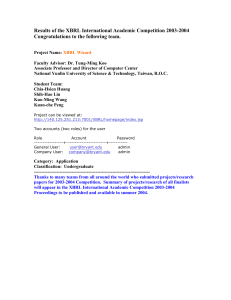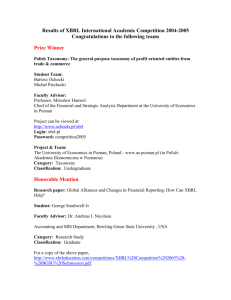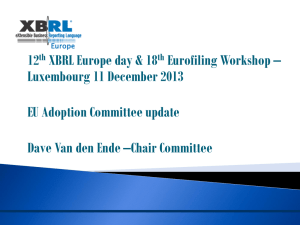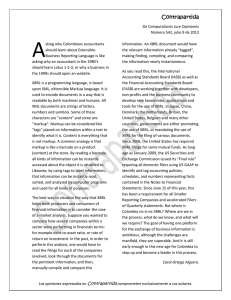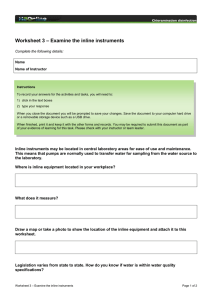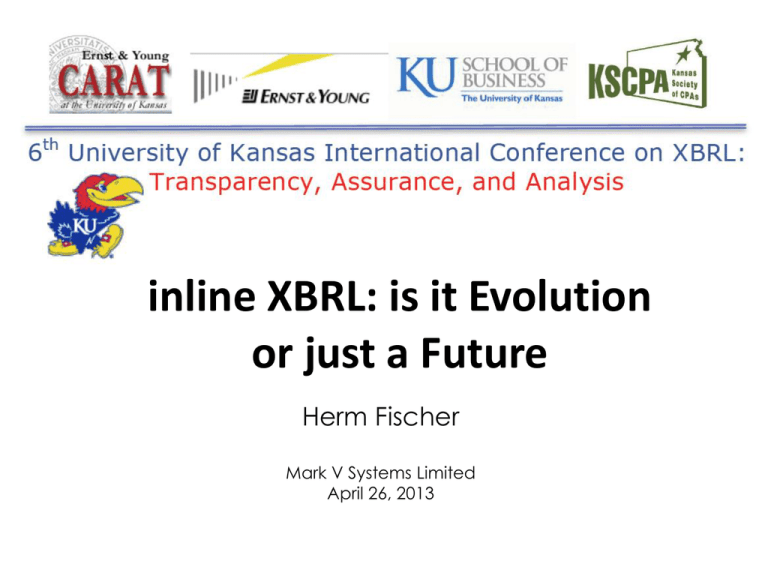
inline XBRL: is it Evolution
or just a Future
Herm Fischer
Mark V Systems Limited
April 26, 2013
Topics
• What’s so hard about cranking up inline?
– HMRC problem
– EDInet (FSA Japan)
– at SEC?
• What gets submitted to authority
• What gets validated
What is inline XBRL
• Old fashioned html document
– Decorated and organized by filer
• Fact values marked with tags
– Numbers (with transformation/scaling)
– Strings etc.
• Contextualizing information is hidden
– Periods, Dimensions, Units, etc.
inline
XBRL
Filing with inline XBRL
HMRC
Use
Case
Model of inline XBRL
HTML supported
• No Doctype in html (tricks for old IE versions)
• Semi-custom html-4 (validated by xsd)
– No html-5 stuff
SEC Filing
• Before inline XBRL
– 8k/10k (1 html/text file)
– Instance in XBRL (1 file)
– Schema and linkbase files
• After inline XBRL
– 8k/10k (1 html file(s) with inline markup)
– Schema and linkbase files
Filer Manual Accommodations
• There will be duplicate facts
– Most accurate likely prevails (?)
• May be other EFM issues
Validations
•
•
•
•
•
•
HTML syntax (schema, not DTD)
Inline transformations and contextualizations
XML of extracted instance
XBRL 2.1, dimensions
Edgar Filer Manual
(Not by SEC: public pillory on the cloud)
What gets rendered to consumer
• The original source html
– Has decorations, style, and ordering of filer
• The extracted XBRL instance
– Normalized information and appearance
– Normalized ordering of information
– Uniform rendering like among accessions
• **both of these (my opinion)
Round trip re-rendering
• From inline source
– Extract XBRL facts, contextualizing information
– Render normalized way (e.g., SEC website)
include inline in normalized HTML rendering
• Should be losslessly recyclable
like a Möbius strip
• Never get original decorations
back
Changes for Japan
• EDInet will use inline XBRL “document sets”
– Each schedule a separate html document
– Footnotes and notes in separate document at end
• Needed extensions for
– Date formats (emperor’s birthday-based dates)
– Shared numbers (“same-as-left column”)
– Fact-explanatory-fact footnote-links
– Text continuation (strings split across sections)
2. Abbreviated notations - Situation in Japan
A notation of “Same as left” is really often used in
JP typical reporting documents, and we have
similar problems as UK vendor reported.
At the end of
fiscal year
(2012-01-31)
Number of issued
shares
fact=8176452
At reporting
date
(2012-04-26)
fact=“Same as left”?
Prior consolidated fiscal year
(2009-04-01~2010-03-31)
Current consolidated fiscal year
(2010-04-01~2011-03-31)
fact=3
fact=“Same as left”?
Number of
consolidated
subsidiaries
Copyright © 2012 XBRL Japan Inc., All Rights Reserved
15
Practical issues in Japan
• Some consumers have XBRL-aware tools
– Adequate inline support exists
• Told that FSA will not send out XBRL instances
– Instance semantically identical to inline
• Independent software guys need support
– Want open source only, no licensed software
– Original prototype inline extractor not usable
– So do they have to scrape from HTML? Can they?
What can we learn from usage?
•
•
•
•
? document set filings (> 1 html)
? download extracted instances
? available open source software
? render from XBRL without decorations

